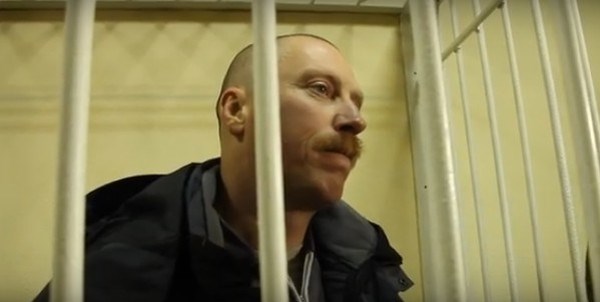Russia demands that Ukraine extradite a detained Georgian officer
Russia wants Ukraine to extradite a Georgian volunteer, Gia Tsertsvadze, who participated in the war in the Donbas. He was detained at Kyiv's Zhulyany Airport on January 15 while trying to leave Ukraine.
Tsertsvadze was told he was on Interpol’s international most wanted persons list. The manhunt was initiated by Russia, who is accusing him of a murder in the territory of the Russian Federation in 2003. Kyiv court chose a 40-day arrest as a preventive punishment for Tsertsvadze and put him in jail. The defense has already appealed against this decision to the Kyiv Court of Appeals.
The detained volunteer’s relatives and lawyers have assured that the accusations against him are fabricated. The accused learned he was wanted by Interpol directly at the moment of departure from the airport. Tsertsvadze’s lawyer, Ksenia Prokonova added that the documents showed that the information about him had been entered in the international search list on December 23, 2016.
According to the lawyer, the imputations of the murder are fabricated and politically motivated. As proof, Prokonova adduced the fact that in 2003, Tsertsvadze did not leave Georgia. He was serving in the Georgian Special Armed Forces at the time, under tight security, particularly regarding traveling abroad, especially to Russia. Therefore it is absolutely impossible that the Georgian officer could have killed someone in the territory of another state. Earlier, Tsertsvadze participated in two Russian-Georgian conflicts in 1992-93 and 2008.
Former Deputy Prosecutor General of Georgia David Sakvarelidze confirmed Prokonova’s claims. In his opinion, the case of Tsertsvadze only appeared after his active participation in the ATO in the Ukrainian Donbas.
Ex-President of Georgia Mikheil Saakashvili also spoke in support of the ATO volunteer. He called on the Ukrainian authorities not to extradite the Georgian officer to the Russian Federation. On his Facebook page, Saakashvili wrote, "Gia was involved in many secret operations in the Donbas, and later he became an instructor for the Ukrainian Special Forces... Georgian special services passed Tsertsvadze’s personal information to the Russian Federation, which enabled the Russians to accuse him in a fabricated case and declare him wanted. It is a common tactic by Moscow and it is well known in Ukraine."
In Georgia, Tsertsvadze’s arrest drew a wide response. The reason for that, according to a representative of the parliamentary majority and the chairman of the Defense and Security Committee Irakli Sesiashvili, is that Tsertsvadze is not just an ordinary former employee of the power structures of Georgia. He is a former senior commando and a bearer of classified information. This is another reason Georgia is against his extradition to the Russian Federation.
In addition, the United National Movement Georgian party has demanded that Georgia's main prosecutor's office start an investigation into the responsibility of the Georgian government institutions for the detention of Tsertsvadze. The Prime Minister of Georgia, Giorgi Kvirikashvili also spoke against the extradition of the Georgian officer to Russia.
However, the Ukrainian Prosecutor General's Office could not immediately determine whether Tsertsvadze was really involved in the war in the Donbas in the East of Ukraine or not. The reason is that the Georgian officer served in one of the battalions of the Security Service of Ukraine where he carried out secret missions. Therefore, the Security Service of Ukraine does not want to issue appropriate references, as the operations in which Tsertsvadze participated are classified. Participation of the detained officer in the Donbas was confirmed by the ex-deputy prosecutor general of Georgia, David Sakvarelidze. He said he personally coordinated the Georgian volunteers who decided to fight in the Donbas.
Several people's deputies of Ukraine, Vyacheslav Kostyantynovsky, Yehor Soboliev, Semen Semenchenko, Pavlo Kostenko and Kostyantyn Usov have already vouched for Tsertsvadze and offered to post bail for him. The Advisor to the Minister of MIA of Ukraine, Zorian Shkiryak also wrote on his Facebook page that the Georgian officer must not be extradited to the Russian Federation. At the same time, the commander of the “Georgian Legion,” Mamuka Mamulashvili said that the Legion would leave Ukraine if Tsertsvadze is extradited to Russia.
The Prosecutor General's Office said that they could refuse to extradite Tsertsvadze to the Russian Federation if "there are circumstances indicating a threat of death or torture." This was stated by Deputy Prosecutor General Yevhen Yenin. He also added that the Ukrainian authorities had acted in accordance with international law in relation to the detention of Tsertsvadze: "We had no choice, as Tsertsvadze had turned up in the Interpol Red Notice".
Later, the Prosecutor General of Ukraine, Yuriy Lutsenko wrote on Facebook that he had personally spoken with representatives of the Georgian corps of the Ukrainian Armed Forces, with the Prosecutor General of Georgia, Irakli Shotadze and a representative of the Georgian opposition, Givi Targamadze.
"Their appeal, as well as the analysis of the provisions of international conventions, gives grounds not only to release Gia Tsertsvadze from custody for the period required for the extradition check, but also for the further decision to refuse to extradite to Russia the person who had supported the defense of Ukraine and Georgia from Russian aggression,” Lutsenko wrote.
On Thursday, January 26, at the request of the Prosecutor General's Office, the court in Kyiv lifted temporary arrest from Gia Tsertsvadze and he was released from the temporary detention center.
According to volunteers and human rights advocates, to date, there are about 200 foreign fighters in the Donbas, mainly from Russia, Belarus and Georgia, who can be extradited. Most of them are wanted by Russia. The status of refugee or Ukrainian citizenship may save them from deportation. Also, the solution to the situation may become a law, which would impose a moratorium on the extradition of volunteers. Such a bill was submitted to the Verkhovna Rada of Ukraine last year. It has been approved by all the committees, but the document has no been not put to the vote yet.
